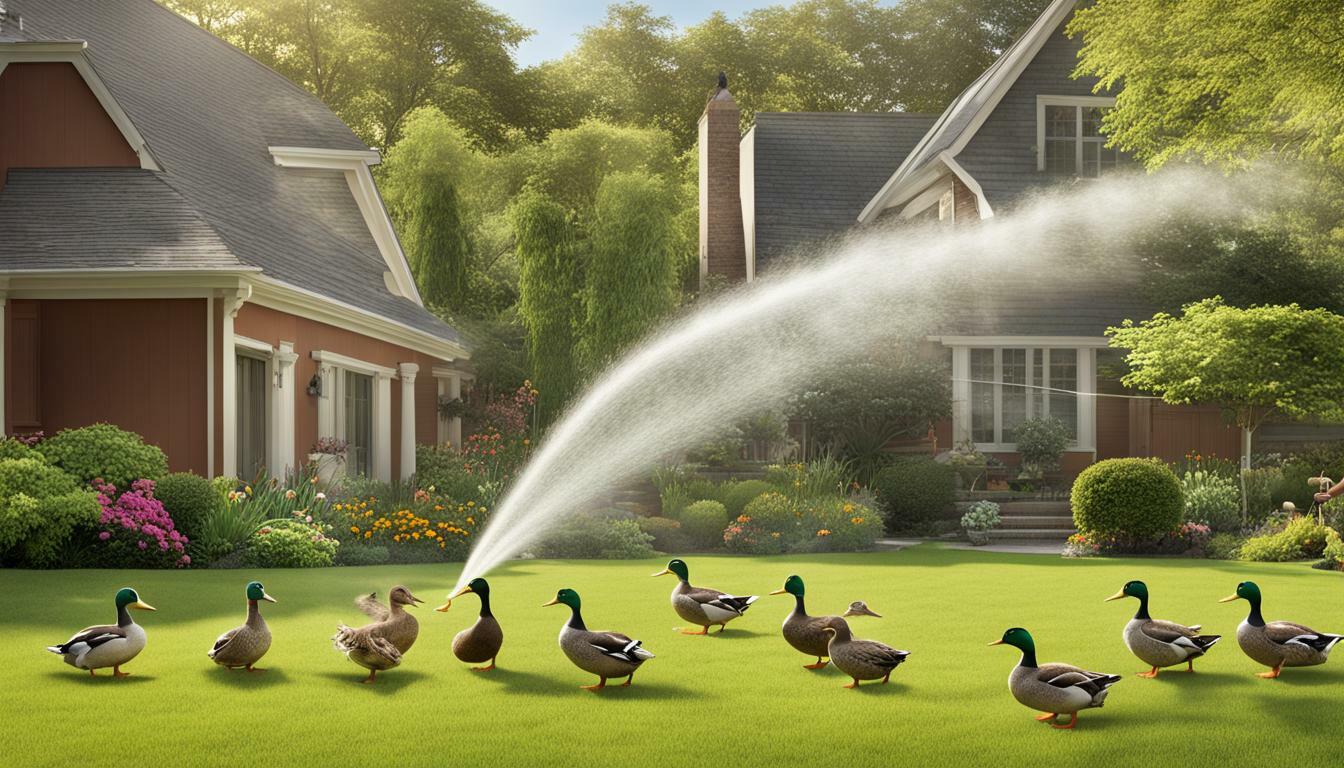Can Ducks Swim In Saltwater Pools?

Table of content:
Having ducks visit your backyard pool can be a fun surprise. Ducks are naturally drawn to water sources to play, bathe, and cool down. However, most backyard pools contain chlorinated freshwater instead of natural ponds or lakes. Saltwater pools are also growing in popularity. This raises the question – can ducks swim in saltwater pools safely?
While ducks have innate swimming capabilities, swimming in saltwater pools poses some potential risks. Their bodies are adapted for freshwater environments. Saltwater may irritate their eyes, skin, feathers, and more. Additionally, drinking saltwater could lead to dehydration. There are a few factors to consider before allowing ducks to take a swim in your saltwater pool.
How Ducks Are Adapted for Freshwater Environments
To understand why saltwater may be problematic for ducks, it helps to first look at how their bodies are specially adapted for swimming and living in freshwater.
Ducks have webbed feet to provide propulsion in water. Their feathers are tightly packed with oil that helps repel water and keep them dry and insulated. Their eyes have a protective third eyelid that acts as goggles underwater. They even have nostrils that can close to keep water out while diving.
Ducks have very lightweight, hollow bones to help them float on the surface. Their legs are positioned far back on their bodies in order to efficiently steer through water. Duck eggs contain more albumen (egg white) which makes them float upwards in nests.
All of these physiological adaptations allow ducks to thrive swimming, wading, and foraging in ponds, marshes, and other freshwater sources. Their buoyancy, vision, feather insulation, and other traits are fine-tuned for freshwater environments.
The Potential Risks of Saltwater Pools
With bodies evolved for freshwater, swimming in a saltwater pool poses some risks and discomforts for ducks:
Irritation to Eyes, Skin, and Feathers
The high salt concentration of saltwater pools can irritate a duck’s eyes, skin on its legs and feet, and especially its feather coat. Ducks spend much of their time preening and maintaining their insulating feather layers. Salt residue and water penetration into the feathers can diminish their protective qualities.
Dehydration from Drinking High-Saline Water
Ducks will naturally drink water from pools while swimming, bathing, and preening. However, ingesting large amounts of saltwater can lead to dehydration. Their bodies are unable to properly process the high salt content.
Disorientation from Chlorine
Chlorinated saltwater pools contain chloramine compounds that are irritating to the eyes and skin. Some ducks may experience disorientation or confusion when swimming in these chemical compounds.
Bumblefoot Infections
Bumblefoot is a bacterial infection of the foot caused by abrasions and cuts. Saltwater may aggravate webbed feet and cause openings for infection, especially if the pool floor is rough.
Metabolic Function Difficulties
The high osmotic pressure in saltwater makes it difficult for freshwater ducks to maintain their electrolyte balance. This can disrupt metabolic functions. Prolonged exposure is particularly problematic.
Clearly, saltwater pools contain some inherent risks for ducks not adapted to saltwater environments. Certain precautions must be taken to ensure duck visitors do not experience these adverse effects.
Safely Allowing Ducks to Swim in Your Saltwater Pool
If ducks have found their way into your saltwater pool, here are some tips to make sure their swimming experience is safe and enjoyable:
- Provide ramps or shallow steps so ducks can easily get in and out of the pool. Ideal depth is 10-30 cm.
- Allow access only for brief 30-60 minute periods to limit saltwater exposure.
- Add a freshwater station such as a bucket or fountain that ducks can use to rinse their eyes and feathers.
- Temporarily switch the pool from saltwater to standard chlorine if ducks are frequent visitors.
- Discourage drinking of pool water by providing a freshwater source.
- Protect feet from abrasions by smoothing out rough pool surfaces and minimizing chemical concentrations.
- Monitor for signs of distress such as irritated skin, eyes, shaking, or listlessness
With these precautions, ducks can safely swim and play while minimizing damage to their eyes, skin, and feathers. Never alter disinfectant levels when swimmers are present. Proper circulation and filtration is still needed to keep water sanitary.
Creating a Duck-Friendly Swimming Environment
If ducks regularly frequent your pool, you may want to consider converting a portion of your pool into a designated “duck zone”. Here are some tips:
- Convert an unused shallow end into a ramped freshwater wading pond. Install gradual sloped steps.
- Use chlorine instead of saltwater generation in the duck zone and keep levels low.
- Add floating ramps, buoys, and shelters to create an engaging space.
- Install circulating pumps and filters to keep water sanitary for both humans and ducks.
- Place hydration stations, food, and nesting materials along the perimeter.
- Use pool netting to safely separate the duck zone from human swimming areas if needed.
Creating a custom duck-friendly swimming and play area can allow humans and ducks to safely enjoy pool time together. Always keep ducks confined to their designated zone when people are present.
Alternative Water Sources for Ducks
If your saltwater pool environment just won’t work well for visiting ducks, you can provide them with alternative freshwater sources on your property. Here are some great options:
- Small garden pond with ramp or gentle slope for entrance and exit
- Birdbath with shallow basin no more than 3 inches deep
- Running water fountain, waterfall, or mister
- Allow access to an unused hot tub filled with fresh water
- Water garden with aquatic plants and circulating pump
- Child’s plastic wading pool, refilled regularly
- Allow ducks to play in lawn sprinklers
- Build a temporary splash pool from a kidde pool or water trough
Providing an appealing freshwater source can allow ducks to comfortably swim, play, preen and cool down without the risks of a high-saline pool. Make sure to refresh water frequently and avoid stagnation. With some creativity, you can design a perfect duck pond paradise!
Final Thoughts
Ducks can occasionally swim in saltwater pools, but their bodies are best adapted to freshwater environments. Saltwater carries irritating effects and potential health risks for ducks not evolved for saline conditions. With proper precautions, temporary saltwater swimming can be safe for visiting ducks. For frequent ducks guests, creating a special freshwater duck zone provides the ideal swimming habitat. There are also many alternative freshwater sources you can provide on your property beyond a chlorinated pool. Understanding duck physiology helps ensure our backyard paradises are enjoyable for both ducks and people alike!
Welcome. I’m Adreena Shanum, the proud owner of this website, and I am incredibly passionate about animals, especially poultry. I founded adreenapets.com as a labor of love, stemming from my desire to share my knowledge and experiences with poultry enthusiasts worldwide.




